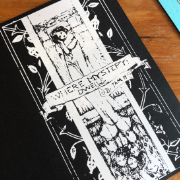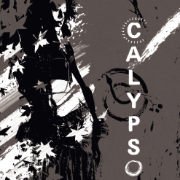Imaginary GM System (iGMs)

filed under soloing on 15 Oct 2016
tagged solo, solo gaming, tool, emulator, igms, and solo frameworks
Largely inspired by reading old Forge posts and threads on game theory from the years 2005 to 2008. What can I say, I’m a little behind the times.
…and a bunch more along those lines.
What It Is
A simple method of arbitrating ‘what happens’ in a fluid, story-based solo RPG session. The goal is to concentrate attention on the rolls that involve conflict, where the player – you – and the gm – also you but played for this bit by some dice – want different things out of a situation.
You need some way to determine what happens. For the iGM system, there are two aspects to any answer – “Yes” or “No”, and “But” or “And”. Whether an answer is “Yes and” or “No and” isn’t really important. You could roll two d6s, counting one as ‘Yes’ on 1-3 and ‘No’ on ‘4-6’, and the other as ‘And’ (Intensified) on 1-2, ‘no modifier’ on 3-4, and ‘But’ (Changed) on 5-6. Or you can use any existing six answer system (FU, CRGE, my own Chaos Oracle). In Pythia, the “How’s it Going?” oracle, in the “Yes/No” flavor, works well too.
It is also helpful to have some way to generate random events, event seeds, twists, or similar wrinkles, in case your imaginary GM decides you don’t get what you want.
Basics
A “statement of intent” is a clear and unambiguous phrase that indicates some way you want to change the game world via the agency of your character.
An “outcome” is the logical consequences of that statement of intent coming to fruition or being made part of the game’s fiction.
A “mechanic” is any mechanism built into the base RPG system you’re using for arbitrating conflict resolution. An attack roll, a saving throw, a token pool, Action points, a spell, a feat.
Make a statement of intent clearly outlining what your character intends to do, considering the most likely outcome, then roll against your oracle, treating the response as if it came from a GM you’re collaborating on a game with.
You should know what you intend to have happen, and what the most logical outcome is, as well as what action the character is taking, if things go the way you want them to. The results of the oracle roll will indicate if the action succeeds outright or if you need to make a mechanics check for it, and if the intent of the action succeeds or is subverted in some way.
The statement of intent should be something that is driven by your character and is something he could theoretically accomplish given the established fiction and physics and rules. You can change the world a bit with your statement of intent, if it seems to fit, or reveal something previously hidden or undetermined that seems plausible or necessary, but it should primarily be driven by your character. Save the world-building for a regular oracle question. The statement of intent doesn’t have to be positive, either. It just has to be what you want to achieve for the character.
Remember, too, YOU control your character. If the motivation for an action is coming from what your character would logically want but you, the player, don’t want that action to happen, just come up with a plausible way to avoid it in game. You don’t have to ask the the iGM to force you into the action or give you a reprieve from it. Or do, and let the dice fall where they may!
My hero will successfully navigate the maze.
My hero wants to dodge out of the way of the hail of bullets.
My hero successfully wins the duel with style and panache.
You shouldn’t use this system every single time your hero attempts something. If a statement of intent is within the hero’s scope of abilities and the challenge is easy enough that it’s a foregone conclusion for one of his skill (ie, you wouldn’t even bother making him roll mechanics for it normally), don’t waste time asking, it just happens. If the statement of intent is unopposed by in game forces, it stands. If the statement of intent would be the most interesting thing to happen and you can’t think of immediate alternatives, just have it happen. And finally, if you’re on a roll and don’t think to ask (or think asking would derail things), don’t sweat it.
Results
Is the answer Yes or No?
On a “Yes” you get what you want. Any time a “yes” answer comes up, the statement of intent represents fictional reality. It’s a foregone conclusion. The GM agrees with you that it should happen, so there’s no conflict, so it does. If there’s a qualifier, you might not get everything you want or get it in the exact way you want it, but because it’s a “yes” the action in the statement of intent happens.
Ok, your hero dodges out of the way of the bullets.
On a “No”, there’s a conflict between what you want and what the GM wants. You need to roll your mechanics as normal to see if you accomplish the task. If there’s a modifier, as with a ‘yes’ answer, the outcome might be different than expected regardless of if you fail or succeed.
Make an evasion saving throw to dodge out of the way of the hail of bullets.
Is there a qualifier?
If not, continue playing or make a roll as indicted. Things play out pretty much as intended by your, uh, intent, or contrary to it in a logical way if you fail a required roll.
If there is, the GM wants to do something GM-y that subverts the intent of the hero’s action. You should consider any qualifiers separately from the ‘yes’ or ‘no’ aspect of a result. The modifications stemming from a qualifier might be positive or negative or neutral; the only requirement is that it subverts the intent of the hero’s action – however, if the primary result is “Yes” the hero will succeed at his statement of intent and on a “No” he has to roll or use a mechanic to see if he fails or succeeds.
On a “But”, there’s an unintended consequence that runs directly counter to your intent. Introduce a wrinkle, complication, sudden change, previously hidden thing, random event, or drawback that subverts the hero’s intent and changes the immediate outcome in some way that directly counters what the hero wanted. If in doubt, remember that “… without injury” is implicit in pretty much every statement of intent a hero makes!
On an “And”, your intent succeeds, only more so – it’s all about extremes. If you intended to subdue someone, you kill them by accident. If you intended to seduce them temporarily, they fall in love with you. If you intended to wave the torch at the vampire, you set the room on fire. The ‘more so’ also applies to long-term consequences and endeavors, if that would make more sense than an immediate outcome.
Bargaining
Any time you are required to use a mechanic and succeed, you can choose to take a failure instead in order to change some aspect of the situation in a way that’s favorable AND interesting. Treat it exactly as if you failed the mechanic and apply subsequent results as usual (including any changes or intensifications from any modifiers). At some point within the current scene or the next, you can modify some aspect of the situation to your liking.
Any time you roll up a modifier and a “no” result, you can choose to discard the modification (ie, the consequence) by retracting the action. You’ll need to figure out a different method to achieve your goal, though.
Finally, if you can’t think of a good modification or nothing seems to make sense, roll a random event on the spot and interpret it as the GM changing the entire situation to the point where the original statement of intent is invalidated, either by circumstances changing or by a new, more difficult decision arising (see “Outcomes” below).
Outcomes
As a general rule, once a statement of intent has been made and accepted (by a ‘Yes’ from the GM or by a mechanics roll from the player), the outcome should stand as fact. The exception is if the GM changes things on a qualifier so that your hero’s statement of intent is no longer necessary, or if the resulting change prompts a new and interesting character decision. Always allow the hero a chance to make a decision (or choose not to make one) whenever possible.
Note, there’s a lot of good drama to be had from the fallout of decisions that in hindsight turn out not to be all that great because you were missing some crucial bit of information. But if your character’s girlfriend is calling him from beyond a portal to hell just as he’s about to speak the words to close it, he should get a chance to agonize over what to do, not be required to speak just because you said he would.
Notes on Odds
As written, your hero will succeed at anything he attempts about half the time outright, as the GM agrees with you and there’s no conflict. The other half, he’ll be required to engage with a mechanic.
If this is too successful for you, feel free to count an unmodified ‘yes’ and ‘no’ as the same unmodified ‘no’, increasing the chances you’ll need to roll a mechanic and removing unqualified successes from play. If you’re using two d6s, just reduce the odds of a “Yes” to 1-2.
If you want every iGM system oracle result to involve a mechanic, just remove the “yes/no” part entirely, make roll your mechanic roll, and then roll the modification die to see how or if the outcome is changed from expected.
I’ve been trialling this in my pulpy noir game, and it works pretty well to give scenes direction and focus. I’m not 100% satisfied with it, though – the ‘but’ and ‘and’ outcomes are just a little hard to come up with on the spot in play, and I’m not happy with what tacking it onto an existing oracle does to the odds. But it does seem to streamline play and add lots of opportunities for making my character’s lives more interesting.


